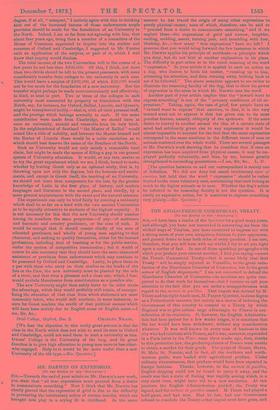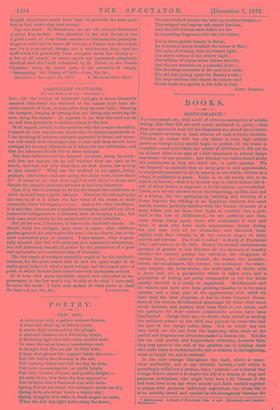THE ANGLO-FRENCH COMMERCIAL TREATY.
[TO THE EDITOR OF THE " SPEOTATOL'l
San, —I have been a reader of the Spectator for a good many years, and although 'you have not succeeded in converting me from the wicked ways of Toryism, you have contrived to impress me with a strong sense of your own scrupulous fairness to your opponents, and general desire to hear both sides of every question. I am sure, therefore, that you will bear with me whilst I try to set you right upon a matter of fact. In one of those sparkling paragraphs with which you preface your current number, I find you saying—anent the French Commercial Treaty—that it seems likely that that Treaty "will be simply rejected at Versailles, to the great satis- faction of the Manchester Chamber of Commerce, but to the great sorrow of English shipowners." I am not concerned to defend the Manchester Chamber of Commerce—its members are quite com- petent to do that work for themselves—but I venture to call your attention to the fact that you are under a misapprehension with regard to the surtaxe de pavilion. That impost was devised by M. Thiers and his right-hand-man, M. Pouyer-Quertier, in some degree as a Protectionist measure, but mainly as a means of inducing the Government of this country to consent to a Treaty by which England was to give certain large advantages to France in con- sideration of its remission. If, however, the English Administra- tion had been patient for a few weeks longer, it is notorious that the tax would have been withdrawn without any consideration whatever. It was well known to every man of business in this city who had relations with France, and it was, moreover, expounded in a Paris letter in the Times some three weeks ago, that, thanks to this protective law, the producing classes of France were unable to obtain a market for their goods. The quays of Rouen, Havre, St. Mato, St. Nazaire, and in fact, all the northern and north- western ports, were loaded with agricultural produce. Under ordinary circumstances, that produce would have been exported in foreign bottoms. Thanks, however, to the surtaxe de pavilion, English shipping could not be found to carry it away, and the result was that a state of feeling was rapidly arising which, in a very short time, might have led to a new revolution. At this juncture the English Administration yielded ; the Treaty was signed, and the surtaxe de pavilion ceased. M. Thiers had played a bold game, and had won. Had he lost, had our Government refused to conclude the Treaty—that impost must have gone, and ,
English shipowners would have been in precisely the same posi- tion as that which they now occupy.
One last word. In Manchester we are all, without distinction of party, free traders. One objection to the new Treaty is that it gives a sort of Free-Trade sanction to Protectionist principles. England could not be worse off without a Treaty than she is with one, for it is an actual, though not a well-known, fact, that the tariff which has practically been accepted under the Treaty is— so far, at all events, as cotton goods are concerned—absolutely identical with the Tariff submitted by M. Thiers to the French Chamber, when he urged upon it the necessity of simply "denouncing" the Treaty of 1860.-1 am, Sir, &c.,
Manchester, November 30, 1872. A MANCHESTER MAN.



































 Previous page
Previous page